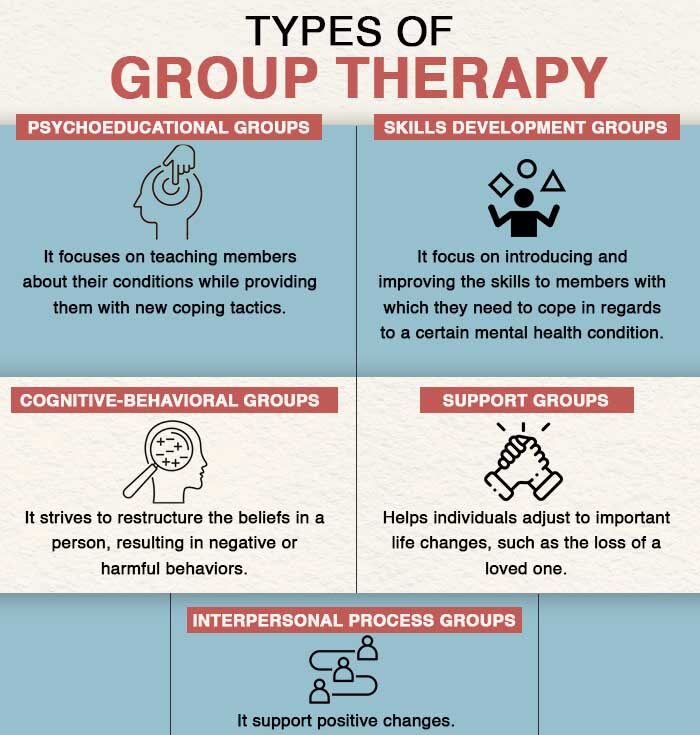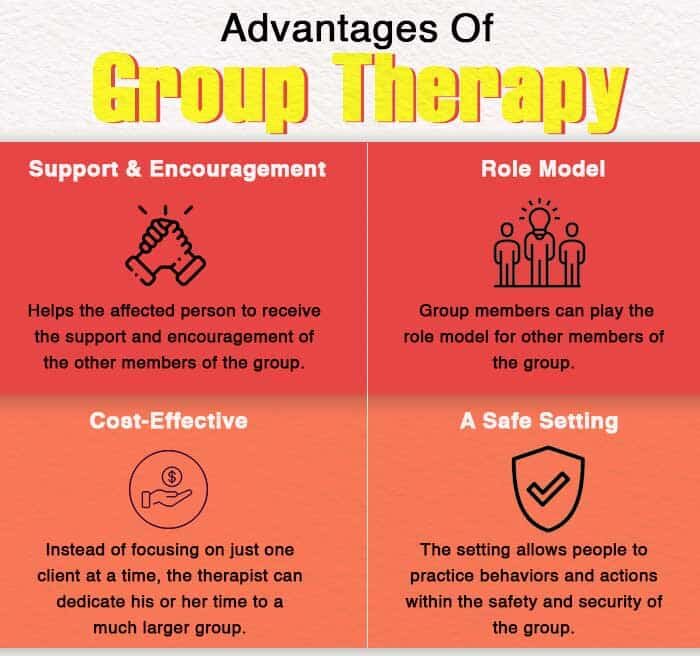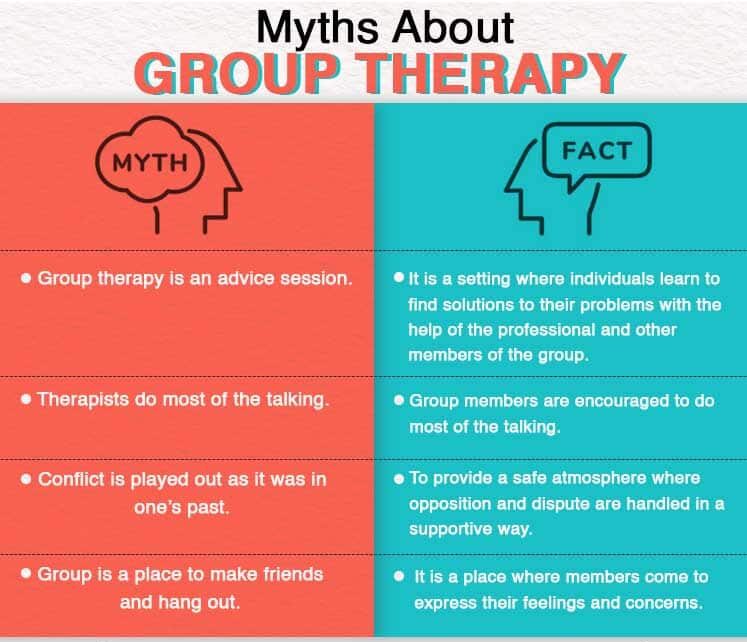Group therapy is a form of psychotherapy where several people meet together under the direction of a professionally trained therapist. In this setting, individuals share experiences to help each person process, cope, and grow. The therapy is widely used and has been a standard treatment option for over half a century.
What Is Group Therapy?
Group therapy is a type of psychotherapy, involving one or more therapists, working with several individuals or patients at a particular time. This type of therapy is widely accessible at multiple locations including private therapeutic practices, mental health clinics, hospitals, and community centers. While group therapy is sometimes used alone, it is also commonly combined into a comprehensive treatment plan that also includes individual therapy and medication. It can help individuals to improve their mental health. It requires at least one mental health professional and two or more people in therapy.
Experts at the Mind Help explain “this psychotherapy includes one or more mental health experts who guide and help a group of patients, which may involve 5 to 15 individuals. Each session may last for an hour or more, conducted every week.” The dynamism of the group often encourages people to feel supported as they move along with the treatment. Whether the goal is growth-oriented, improving social skills, or something else, group therapy can help one achieve the same.
A 2018 study 1 Ezhumalai, S., Muralidhar, D., Dhanasekarapandian, R., & Nikketha, B. S. (2018). Group interventions. Indian journal of psychiatry, 60(Suppl 4), S514–S521. https://doi.org/10.4103/psychiatry.IndianJPsychiatry_42_18 explains that it is “a form of treatment in which emotionally disturbed persons are placed in a group, guided by one or more therapists for the purpose of helping individuals to bring a change in them.” The objective is to improve social functioning of patients by using meaningful group experiences and to enable them “to cope more effectively with their personal, group or community problems.”
How It Can Help?
Group Therapy has a number number of important functions that can significantly help patients, such as:
- Therapeutic
- Developmental
- Corrective
- Preventive
- Educative
- Recreational
There are several groups designed to address a specific problem, such as depression, social anxiety, panic disorder, obesity, substance abuse or chronic pain. Other types of groups may focus more on general improving social skills. These may cater to helping people to deal with issues such as anger, loneliness, shyness, and low self-esteem. Such groups often reach out their helping hands to help individuals who have experienced loss, be a spouse, a child, or someone who has committed suicide. Thus, such therapy groups help people whose mental state makes it a challenge to get through daily life. It is worth mentioning that individuals with no such pressing concerns are also welcome to join such groups. Hence, the key topics addressed in this therapy include:
- Addiction
- Divorce
- Domestic violence or abuse
- Anger management
- Anxiety
- Parenting
- Communication issues
- Food and eating issues
- Grief and loss
However, it must be noted that a professional or a therapist may not recommend group therapy as a treatment option right away, at the beginning of the treatment plan. It is because, for most, it can be hard to share personal information in a group setting, especially at the beginning of treatment.
Read More About Grief Here
How It Works?
According to a study, group therapy consists of six to twelve members who meet to share their sentiments and concerns. One or two group therapists help to start the discussions and carry it forward. However, a successful therapy session is largely determined by the willingness of individuals to participate in a session. Here, the members give feedback to each other by expressing their own feelings regarding what someone says or does.
Thus, such communication gives group members a chance to try out new ways of behaving along with learning new ways of interacting with others. What makes the situation unique is that it is a closed and safe system. The topic of discussion in a session is kept confidential as what members discuss is not disclosed outside the group. In the first few sessions, the main goal of such therapy sessions is to develop a level of trust that allows the member to talk personally and honestly. Group trust is accomplished when all members make a commitment to the group.
Group therapy helps individuals to learn about themselves and improve their interpersonal relationships. It addresses feelings of isolation, depression, or anxiety. It also enables people to make significant changes so they feel better about their lives. Additionally, group therapists can apply the principles of a group to other settings and situations such as businesses, schools, and community organizations.
It must be noted that humans have been raised in group environments, either through families, schools, organized activities, or work. It is such environments where we grow and develop as human beings. Group psychotherapy is no different. It provides a place where one can come together with others to share problems or concerns, to better understand his/her own situation, and to learn from other’s suggestions.
If you are considering therapy, together you and your therapist can explore the nature of your problem. You will work to develop a better understanding of the problem and discuss what changes might make the situation better. In addition to this type of therapy, there are several other options available, including:
- Talking with an individual therapist
- Participating in therapy as a couple or family
- Receiving medication
- A combination of the above treatments
Your therapist can help you understand the benefits of each of these treatment options and determine what’s right for you.
Principles Of Group Therapy
Group therapy is a recommended and successful resource for individuals who have had challenging experiences and who are trying to cope and learn from the past to shape a better future. Every therapy session, regardless of its focus, is guided by the same core principles. These primary principles include:
- The instillation of hope
- Connection and universality
- Interpersonal learning
- Development or redevelopment of ideal social techniques, and
- Catharsis
These are explained in detail here.
1. Instilling Hope
The group consists of members coming from varying stages of the treatment process. Observing people coping or recovering gives hope to those at the beginning of the process.
2. Connection & Universality
Being part of a group of people with similar experiences helps other people to realize that what they are going through is universal and that they are not alone.
3. Interpersonal Learning
By communicating with other people and after receiving feedback from the group and the therapist, members of the group can gain a greater perception of themselves.
4. Development of Socialization Techniques
The group setting is a great spot to exercise new behaviors. The setting is safe and supportive, thus allowing group members to experiment without the fear of failure.
5. Catharsis
Sharing feelings and experiences with a group of people can help alleviate pain, guilt, or stress.
Other important principles of group therapy may include:
6. Imparting Information
Group members can help each other by sharing information that can help others to fasten their own recovery process.
7. Altruism
Group members can share their energies and help others in the group, which can further heighten self-esteem and self-confidence.
8. Imitative Behavior
Individuals can represent the behavior of other members of the group or follow and imitate the behavior of the therapist.
9. Group Cohesiveness
Since the group is united by one common goal, members experience a sense of belonging and acceptance.
10. Existential Factors
While operating within a group offers support and guidance, this form of therapy helps members to realize that they are responsible for their own lives, actions, and choices.
The idea behind such a therapy session is to foster that individuals with a certain condition may come across others with similar experiences, thus finding better connection and understanding with other people. It is often helpful for individuals in the early stages of coping with a particular problem, be it grief, an illness, or even addiction, to meet another person who has endured similar circumstances but who has experienced personal growth and therapeutic success.
Types Of Group Therapy

There are several different types of group therapy, and treatment models vary from group to group. The following are mentioned below.
1. Psychoeducational Groups
Psychoeducational group therapy 2 Center for Substance Abuse Treatment. Substance Abuse Treatment: Group Therapy. Rockville (MD): Substance Abuse and Mental Health Services Administration (US); 2005. (Treatment Improvement Protocol (TIP) Series, No. 41.) 2 Types of Groups Commonly Used in Substance Abuse Treatment. Available from: https://www.ncbi.nlm.nih.gov/books/NBK64214/ focuses on teaching members about their conditions while providing them with new coping tactics. These groups deal with a specific condition, such as substance use disorder, anxiety, or phobias.
2. Skills Development Groups
Skills development groups focus on introducing and improving the skills to members with which they need to cope in regards to a certain mental health condition. These groups may incorporate aspects of psychoeducational groups. However, the end goal involves strengthening the members’ behavioral and cognitive resources to enable them to make positive choices and evade harmful situations.
3. Cognitive-Behavioral Groups
Cognitive-behavioral group therapy strives to restructure the beliefs in a person, resulting in negative or harmful behaviors. For example, cognitive-behavioral groups that address substance use disorder, begin by recognizing the situations and environments that trigger addictive behavior. With this perception, members can establish management strategies that support reduced use.
Read More About Cognitive Behavioral Therapy (CBT) Here
4. Support Groups
Support groups are designed to help individuals adjust to important life changes, such as the loss of a loved one. In support groups, members give and receive positive acceptance. Such groups also encourage their members to exhibit their personal beliefs and behaviors.
5. Interpersonal Process Groups
The interpersonal process group model makes use of the psychodynamic approach to support positive change. Psychodynamics is a school of psychology that observes a person’s early life experiences along with subconscious beliefs and feelings as the foundation of their personality and behaviors. Interpersonal process groups focus more on interpersonal group dynamics and less on personal psychology.
Role Of Group Therapy
Although most therapy sessions strive to help individuals to gain a sense of ease, independence, and control over their lives, the goal of this therapy is slightly different from the goal of individual therapy. This form of therapy is beneficial for those who are working through issues that affect many people. Most commonly, group therapy is suggested as part of a larger therapeutic strategy to help promote sharing, bonding, and coping.
There are two primary types of goals in group therapy:
Process goals.
Outcome goals.
A. Process Goals: Such goals relate to the process of understanding personal issues while relating to other individuals during a group session. This is often conceived of as the healing process.
B. Outcome Goals: Outcome goals deal with behavioral modifications that individuals seek to achieve by engaging in group therapy.
The primary goal of group therapy is to introduce a sense of belonging or relatability through understanding, which is accomplished by sharing common experiences. For this reason, group therapy is extremely effective when employed to address a specific concern familiar to all members of the group. This universal relatability is essential to the group’s success.
Additional goals may include:
- Helping people to recognize maladaptive behavior
- Offering help with emotional struggles through positive feedback
- Offering individuals a supportive ambiance of peers with similar life experiences
- Conquering the feelings of loneliness and alienation by bringing together individuals with similar experiences and emotional patterns
It is worth mentioning that for a successful group therapy session, it is essential to design and structure the session by a licensed mental health counselor or psychologist. He/she should be able to move the conversation forward with the initiation of proper sharing. Independent organizations often offer specialized group therapy or support group opportunities that coincide with their missions. For example, many schools host group therapy or support groups for students, especially during finals periods. Likewise, hospitals may have group grief counseling and support resources tailored to particular health concerns or illnesses.
Is Group Therapy Effective?
Group therapy seems to be effective for depression. In a 2014 study 3 Thimm, J.C., Antonsen, L. Effectiveness of cognitive behavioral group therapy for depression in routine practice. BMC Psychiatry 14, 292 (2014). https://doi.org/10.1186/s12888-014-0292-x of group therapy for depression, it was concluded that group treatment can result in significant improvements at both the group and individual level. However, the authors had also mentioned that many people dropped out of the therapy during the course of the study. In a 2019 study 4 Schuster, R., Kalthoff, I., Walther, A., Köhldorfer, L., Partinger, E., Berger, T., & Laireiter, A. R. (2019). Effects, Adherence, and Therapists’ Perceptions of Web- and Mobile-Supported Group Therapy for Depression: Mixed-Methods Study. Journal of medical Internet research, 21(5), e11860. https://doi.org/10.2196/11860 , researchers had examined the effectiveness of a 7-week mobile- and web-based group therapy program for treating depression.
Read More About Depression Here
The participants had noticed significant improvements in depressive symptoms and overall health. These improvements remained stable over the 3-month follow-up period. The researchers of another 2019 study 5 Lo Coco, G., Melchiori, F., Oieni, V., Infurna, M. R., Strauss, B., Schwartze, D., Rosendahl, J., & Gullo, S. (2019). Group treatment for substance use disorder in adults: A systematic review and meta-analysis of randomized-controlled trials. Journal of Substance Abuse Treatment, 99, 104-116. https://doi.org/10.1016/j.jsat.2019.01.016 had reviewed 33 studies regarding the effects of group therapy on substance use disorders. They concluded that it had reasonable effects on mental state compared to no treatment and individuals in the therapy were more likely to refrain from future use than those who did not enroll for the treatment.
However, little attention has been paid to the role of therapeutic processes in this type of therapy outcomes for cancer patients participating in a group. According to a 2017 study 6 Manne, S. L., Kashy, D., Siegel, S. D., & Heckman, C. J. (2017). Group therapy processes and treatment outcomes in 2 couple-focused group interventions for breast cancer patients. Psycho-oncology, 26(12), 2175–2185. https://doi.org/10.1002/pon.4323 , 302 women with early-stage breast cancer and their partners were randomized to one of two conditions. One was an eight-session enhanced couple-focused group intervention (ECG) and the other one was the couples’ support group (SG) intervention.
According to the results, SG participants (both patients and partners) perceived higher engagement and less avoidance than ECG participants. Struggle, working alliance, and therapeutic realizations did not differ. Group engagement, working alliance, and therapeutic realizations had developed and group conflict decreased over the course of both treatments. Patients whose partners reported higher conflict reported greater post-treatment anxiety. The working alliance was associated with post-treatment anxiety for ECG patients and with well-being among participants whose partners reported higher working alliance.
Thus, cultivating a positive group environment reinforces treatment efficacy for women with early-stage breast cancer and their partners attending couple-focused groups. Promoting the leader-member alliance supports treatment efficacy. Improving engagement with one member of a couple impacts the other member.
Advantages Of Group Therapy

There is no doubt that this type of psychotherapy can be beneficial for most patients and significantly help them to recover. The principal advantages of group therapy are as follows.
1. Support And Encouragement
Group therapy helps the affected person to receive the support and encouragement of the other members of the group. When people participate in the group, they get to see others who are also going through the same thing, which, in turn, helps them feel less alone.
2. Role Model
Group members can play the role model for other members of the group. By witnessing someone successfully coping with a problem, other members of the group learn that there is hope for recovery. With each person progressing, they can, in turn, serve as a role model and support figure for others.
3. Cost-Effective
Additionally, this form of therapy is often very affordable. Instead of focusing on just one client at a time, the therapist can dedicate his or her time to a much larger group.
4. A Safe Setting
The therapy offers a safe haven. The setting allows people to practice behaviors and actions within the safety and security of the group.
Valuable Feedback
By working in a group, the therapist can see directly how each person is responding to other people and behaves in social situations. Through this observation, the therapist can provide valuable feedback to each client.
Risks, Limitations and Ethics
Group therapy is perfect when it comes to engaging in a complementary form of therapeutic support. Normally, individuals who are good performers at a group therapy session, also have individualized concerns that are best approached by some form of one-on-one therapy, such as cognitive-behavioral therapy. Since the therapy sessions are designed to discuss concerns in front of everyone, confidentiality cannot be guaranteed the same way that it is secured in individual therapy sessions.
As the most cost-effective form of mental health counseling, group therapy is usually prescribed for those who will benefit from the shared experiences of others. However, this form of therapy has its limitations. Interpersonal learning and sharing contribute to a small amount of growth, which is why it is essential to attend individual therapy sessions as well. Rejecting individual therapy for group therapy is seldom a good choice because there happens to be multiple individual needs and uncertainties that this therapy setting cannot address properly.
There are also risks related to the group therapy process, as well. For example, upon hearing the stories of other members, one might start panicking or get anxious. Thus, it is wiser to pair group therapy with individual counseling, where individuals can discuss such matters in a private setting and process information shared in the group in a positive way that will encourage growth.
Myths About Group Therapy

Just like most of the things on this planet, group therapy also has its own share of myths. According to a study, here are the myths that are worth debunking to bring out the actual reality.
1. Myth: Group therapy is an advice session.
Fact: It is a setting where individuals learn to find solutions to their problems with the help of the professional and other members of the group. The group delivers a safe haven for the individuals to examine their problems and come up with options.
2. Myth: Therapists do most of the talking.
Fact: Group members are encouraged to do most of the talking. Therapists will help to promote discussion, but the progress of the group depends on the participation of the members.
3. Myth: Conflict is played out as it was in one’s past.
Fact: The main aim of the group is to provide a safe atmosphere where opposition and dispute are handled in a supportive way. While difficulties in communicating with people are likely to be recreated in the group, these will be addressed in a manner that will focus on growth and increased awareness.
4. Myth: Group is a place to make friends and hang out.
Fact: Group is not a place to socialize. It is a place where members come to express their feelings and concerns, and it requires commitment and focus.
Feel Supported And Encouraged with Group Therapy
Group therapy is effective in enabling individuals to realize that they are not alone and that there are others facing the same difficulties. Such individuals can provide support and encouragement, ultimately helping their peers to find their way as they rise from their difficulties. This form of therapy is most beneficial for those who are dealing with personal trauma, addiction, illness, or any other form of mental illness. Joining a group of like-minded individuals will encourage people to relate to others in healthier ways, thus helping them to grow personally and coping effectively with the challenges in their lives.
Group Therapy At A Glance
- This therapy involves one or more therapists working with several people at the same time.
- The dynamism of the group often encourages people to feel supported as they move along with the treatment.
- Group therapy helps individuals to learn about themselves and improve their interpersonal relationships.
- Group therapy is suggested as part of a larger therapeutic strategy to help promote sharing, bonding, and coping.
- The primary goal of group therapy is to introduce a sense of belonging or relatability through understanding.
- Group therapy seems to be effective for depression.
- Group therapy is effective in enabling individuals to realize that they are not alone and that there are others facing the same difficulties.











